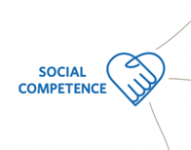by Ashley Cox

The EDI scale I chose to focus on for my term project was social competence. Social competence includes children’s approaches to learning, readiness to explore new things, respect for other peers and adults, and abilities in regards to learning skills and attention. EDI (Early Development Instrument) are used to measure and evaluate young children’s readiness and competence, and its purpose is to report on children from various communities or geographic regions. Environmental influences that have been shown to be risk for factors for vulnerability in social competence levels are things such as poor family structure, poor physical surroundings and physical needs not being met such as clean clothes to wear, clean water, food, and proper sleep. Frequent changes of community and schools can also be an environmental influences that show risk for vulnerability in terms of social competence. Genetic influences that have been shown to be risk factors for vulnerability are when genetic variations influence brain function and social behaviour. If a child has a gene that has been passed down from their parents that is more subject to stress, ADHD, or other learning issues then that makes the child more likely to have trouble in regards to social competence. Genes and environment work together and both influence vulnerability risks for social competence. Resilience is the capacity too recover from difficulties. Resilience factors that have been shown to reduce vulnerability in regards to social competence are general health and well-being, as well as parenting styles and behaviours. These foster resilience in children and allow for it to reduce the affects of vulnerability on young children.
The EDI data gathered for my neighbourhood of Revelstoke (SD 19) was taken over the period of 2016-2019. This was when they saw a significant increase from 13% in 2004-07, to 16.1% in 2016-19. Vulnerability in social competence) for Revelstoke is one of the lowest in BC while some of the highest is 54%. Although low, there is still a percentage that is vulnerable in regards to social competence. Many of the children vulnerable have trouble listening attentively, or following directions, they all not willingly engage in new play and get angry/frustrated easily, do not work well with others, and do not respect other adults, peers, and children’s things. Interventions that may help improve vulnerability could be the community, and schools being more well trained and equipped to teach the children self-regulation skills and allow time for the children to practice these skills further. When children can exhibit self control, and display emotional regulation it will help everyone get along and the child will learn to deal with the frustration in a calm manner. If children continue to have difficulties with emotional regulation, explore emotions further allowing the child to feel it and let it out and learn to cope with it, and develop resilience.

December 13, 2021 at 7:24 pm
Hi Ashley,
I liked how your summary was very concise and easy to follow along.
December 17, 2021 at 6:10 am
It’s interesting to note how sometimes certain aspects of development can interact: here, we can see how emotional behaviours and emotional maturity can interact with aspects of children’s social development as well. This is a great post! It’s succinct and gives the reader a good explanation of the factors that influence child development.